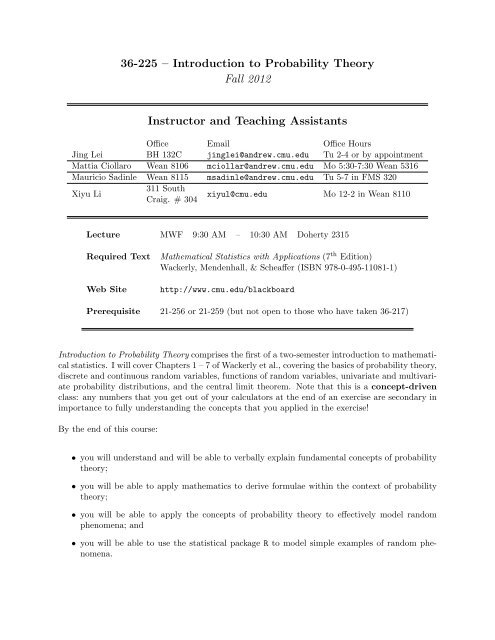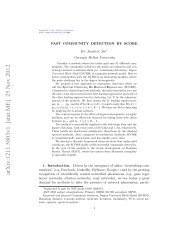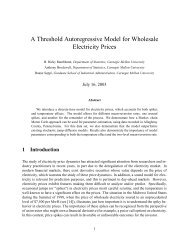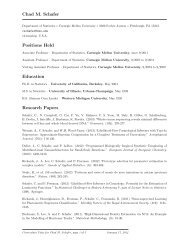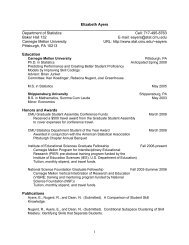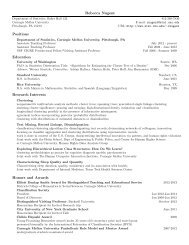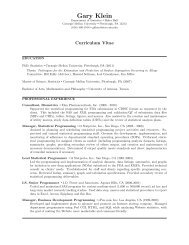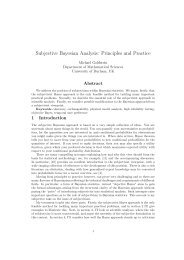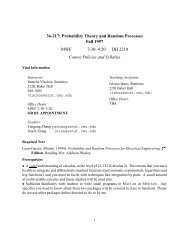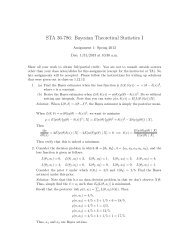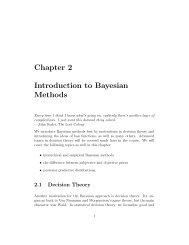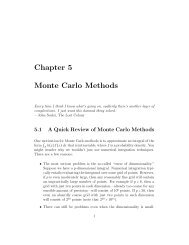36-225 â Introduction to Probability Theory Fall 2012 Instructor and ...
36-225 â Introduction to Probability Theory Fall 2012 Instructor and ...
36-225 â Introduction to Probability Theory Fall 2012 Instructor and ...
Create successful ePaper yourself
Turn your PDF publications into a flip-book with our unique Google optimized e-Paper software.
<strong>36</strong>-<strong>225</strong> – <strong>Introduction</strong> <strong>to</strong> <strong>Probability</strong> <strong>Theory</strong><br />
<strong>Fall</strong> <strong>2012</strong><br />
Instruc<strong>to</strong>r <strong>and</strong> Teaching Assistants<br />
Office Email Office Hours<br />
Jing Lei BH 132C jinglei@<strong>and</strong>rew.cmu.edu Tu 2-4 or by appointment<br />
Mattia Ciollaro Wean 8106 mciollar@<strong>and</strong>rew.cmu.edu Mo 5:30-7:30 Wean 5316<br />
Mauricio Sadinle Wean 8115 msadinle@<strong>and</strong>rew.cmu.edu Tu 5-7 in FMS 320<br />
Xiyu Li<br />
311 South<br />
Craig. # 304<br />
xiyul@cmu.edu Mo 12-2 in Wean 8110<br />
Lecture MWF 9:30 AM – 10:30 AM Doherty 2315<br />
Required Text<br />
Web Site<br />
Mathematical Statistics with Applications (7 th Edition)<br />
Wackerly, Mendenhall, & Scheaffer (ISBN 978-0-495-11081-1)<br />
http://www.cmu.edu/blackboard<br />
Prerequisite 21-256 or 21-259 (but not open <strong>to</strong> those who have taken <strong>36</strong>-217)<br />
<strong>Introduction</strong> <strong>to</strong> <strong>Probability</strong> <strong>Theory</strong> comprises the first of a two-semester introduction <strong>to</strong> mathematical<br />
statistics. I will cover Chapters 1 – 7 of Wackerly et al., covering the basics of probability theory,<br />
discrete <strong>and</strong> continuous r<strong>and</strong>om variables, functions of r<strong>and</strong>om variables, univariate <strong>and</strong> multivariate<br />
probability distributions, <strong>and</strong> the central limit theorem. Note that this is a concept-driven<br />
class: any numbers that you get out of your calcula<strong>to</strong>rs at the end of an exercise are secondary in<br />
importance <strong>to</strong> fully underst<strong>and</strong>ing the concepts that you applied in the exercise!<br />
By the end of this course:<br />
• you will underst<strong>and</strong> <strong>and</strong> will be able <strong>to</strong> verbally explain fundamental concepts of probability<br />
theory;<br />
• you will be able <strong>to</strong> apply mathematics <strong>to</strong> derive formulae within the context of probability<br />
theory;<br />
• you will be able <strong>to</strong> apply the concepts of probability theory <strong>to</strong> effectively model r<strong>and</strong>om<br />
phenomena; <strong>and</strong><br />
• you will be able <strong>to</strong> use the statistical package R <strong>to</strong> model simple examples of r<strong>and</strong>om phenomena.
Administrative Remarks<br />
Lectures<br />
Lecture Notes. Notes in PDF format will be made available prior <strong>to</strong> lectures. A given set of<br />
notes will generally cover more than one lecture. New sets of notes will be posted as needed, no<br />
later than 5:00 PM on the day before they are needed. It is your responsibility <strong>to</strong> print out<br />
lecture notes. Notes will not be complete in the sense that, e.g., I will only write out solutions<br />
<strong>to</strong> exercises in class.<br />
Textbook. The textbook is meant <strong>to</strong> supplement the lectures, <strong>and</strong> for most lectures there will be<br />
assigned reading. All material in assigned readings is fair game for exams, even if it is not explicitly<br />
covered in class, unless I specifically state otherwise.<br />
Attendance. Class attendance is not explicitly required, though it is heavily encouraged as it is<br />
very easy <strong>to</strong> fall behind in a class such as <strong>36</strong>-<strong>225</strong> very quickly.<br />
Perks of Modern Living. The use of lap<strong>to</strong>ps, cell phones, iPods, squeaky slide rules, etc., is not<br />
allowed during lectures. No student may record or tape any classroom activity without my express<br />
written consent (see “Disability Resources” below). Espresso is encouraged.<br />
Software<br />
R. In this class you may be provided the opportunity <strong>to</strong> work with R, a package commonly used by<br />
statisticians. It provides an interpreted language environment (like, e.g., Python). I will cover the<br />
basics of R in class <strong>and</strong> R-based exercises will appear on homework. It is available in the clusters,<br />
but since it is free you may want <strong>to</strong> download it from www.r-project.org.<br />
Homework <strong>and</strong> Tests<br />
Homework. Homework assignments will be posted on Wednesdays on the Blackboard site, <strong>and</strong><br />
will be due one week later. You may h<strong>and</strong> them <strong>to</strong> me in Doherty 2315 at the beginning of class,<br />
or give them <strong>to</strong> me in BH 132C by 9:15 AM. (Electronic submissions will not be accepted.) They<br />
will be primarily based on problems from the textbook <strong>and</strong> as stated above may include (small)<br />
R programming components. It is your responsibility <strong>to</strong> make your homework readable.<br />
Homework assignments that are turned in late will not be graded, regardless of the reason they are<br />
late! Your lowest homework score will be dropped. You must bring any missing homework<br />
score <strong>to</strong> my attention within one week of the homework being graded, so check Grade Center often.<br />
Feel free <strong>to</strong> discuss homework assignments with others, but realize that the work you h<strong>and</strong> in must<br />
be your own. Simply copying someone else’s work is plagarism; see “Cheating” below.<br />
Tests. All tests including the final are closed book <strong>and</strong> closed notes. Calcula<strong>to</strong>rs are allowed <strong>and</strong> a<br />
“cheat sheet” of formulae <strong>and</strong> other information will be provided. The test dates are given on the<br />
last page of the syllabus. Sufficiently ahead of each test I will inform you of the exact material that<br />
it will cover. Each in-semester test covers only that material presented since the previous exam<br />
(about five weeks of material), while the final is cumulative.<br />
In-Semester Test Policy. If you cannot take a test at its scheduled time, please let me know at
least one week beforeh<strong>and</strong> <strong>and</strong> we can attempt <strong>to</strong> come <strong>to</strong> a scheduling accommodation. If you<br />
miss a test, it cannot be made up.<br />
Final Policy. If you cannot take the final at its scheduled time, please let me know at least one<br />
week before the test <strong>and</strong> we can attempt <strong>to</strong> come <strong>to</strong> a scheduling accommodation. If you miss<br />
the final, you will receive a zero for it, though if you present a fully documented excuse you may<br />
receive both an incomplete for the course <strong>and</strong> a future opportunity <strong>to</strong> make up the final. Please do<br />
not schedule travel before the end of finals (Tuesday, December 18) until you know when all your<br />
finals will be held!<br />
Miscellaneous<br />
Cheating. Cheating or plagarism on homework or exams will be dealt with <strong>to</strong> the full extent<br />
allowed under CMU policies: http://www.cmu.edu/policies/documents/Cheating.html.<br />
Disability Resources. If you require a special accommodation, such as needing more time <strong>to</strong><br />
finish exams, please visit the Office of Disability Resources (http://hr.web.cmu.edu/dsrg) <strong>to</strong><br />
obtain appropriate documentation. I will make no allowances without documentation.<br />
Email. When sending email, please put “STAT<strong>225</strong>” “<strong>36</strong>-<strong>225</strong>” at the beginning of the subject line<br />
so that I know the message is not spam. Also, please be advised that sending email <strong>to</strong> me<br />
or <strong>to</strong> a TA does not create a responsibility or obligation <strong>to</strong> respond <strong>to</strong> it. Sending us<br />
email does not shift any responsibility from you <strong>to</strong> us; you are still responsible for completing your<br />
assignments. In particular, do not send complicated questions or requests via email; replies will<br />
not be given for email questions or problems requiring lengthy (more than a couple of sentences)<br />
or complicated responses. These types of communications should be done in person.<br />
Final Grade. Your final grade will be based on a curve. The characteristics of the curve (i.e.,<br />
what grade is assigned <strong>to</strong> the class average score, etc.) depends on how the class does as a whole<br />
<strong>and</strong> will be determined at the end of the semester. Also note that you must receive a C or<br />
higher in this course <strong>to</strong> be eligible <strong>to</strong> take <strong>36</strong>-226.<br />
Grading<br />
Test #1 20%<br />
Test #2 25%<br />
Final 30%<br />
Homework 25%
Important Dates<br />
Week Date What’s Happening<br />
2 3 Sep (Mon) No Class: Labor Day<br />
5 26 Sep (Wed) Test #1, 9:30 am, UC McConomy<br />
8 19 Oct (Fri) No Class: Mid-Sem Break<br />
10 31 Oct (Wed) Test #2, 9:30 am, UC McConomy<br />
13 21 Nov (Wed) No Class: Thanksgiving<br />
13 23 Nov (Fri) No Class: Thanksgiving


